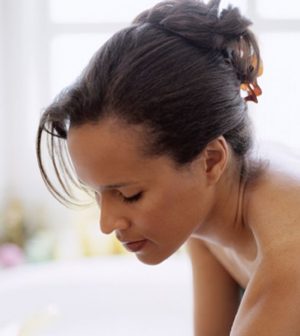- Could Your Grocery Store Meat Be Causing Recurring UTIs?
- Are You Making This Expensive Thermostat Error This Winter?
- Recognizing the Signs of Hypothyroidism
- 10 Strategies to Overcome Insomnia
- Could Artificial Sweeteners Be Aging the Brain Faster?
- Techniques for Soothing Your Nervous System
- Does the Water in Your House Smell Funny? Here’s Why
- Can a Daily Dose of Apple Cider Vinegar Actually Aid Weight Loss?
- 6 Health Beverages That Can Actually Spike Your Blood Sugar
- Treatment Options for Social Anxiety Disorder
Douching: More Harmful Than Helpful

Douching is the age-old practice of using a solution to attempt to clean the vagina, but there’s only downsides to it.
Beyond having no proven benefits, douching can cause many health problems, including bacterial and yeast infections. And if you already have a vaginal infection, it can push bacteria up into your reproductive organs, causing pelvic inflammatory disease, which in turn can lead to fertility problems.
Douching has been linked to premature births and ectopic pregnancies. Research has also found that it can double the risk for ovarian cancer in women who had a sister with breast cancer. For all these reasons, doctors have been recommending that women not douche. Yet it’s still done by many, including teens. In the United States, almost 20 percent of women between the ages of 15 and 44 douche.
Why isn’t douching needed? The vagina is designed to clean itself naturally. Rinsing the outside area is safe, and warm water might be all you need. In fact, if your skin is very sensitive, using even a mild soap can be irritating. So can all scented products, including tampons and pads, so you might want to avoid them.
If you’re douching because of hygiene concerns, know that a mild odor that changes throughout the day is normal. It can even become stronger after exercise, but a quick rinse is still all you need.
On the other hand, a strong and unpleasant odor is often a sign of a health issue, such as an infection. Douching won’t correct it and is more likely to make the problem worse, so see your doctor to find out the cause and the right treatment.
More information
The U.S. Office on Women’s Health has more on douching and its hazards.
Source: HealthDay
Copyright © 2026 HealthDay. All rights reserved.










